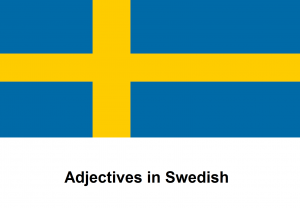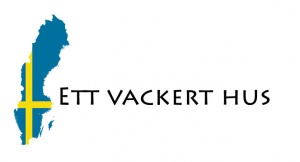Language/Swedish/Grammar/Adjectives
Jump to navigation
Jump to search
Rate this lesson:
.
Hello everybody,
In today's lesson you will learn some useful vocabulary about ¨ADJECTIVES¨ in Swedish
Feel free to edit this page by adding new words and expressions !
Good learning ! :)
.
.
Adjectives in Swedish
| ENGLISH | SWEDISH | PRONUNCIATION IN
ENGLISH |
BRAZILIAN
PORTUGUESE |
| big (m) / | stor | stoh | grande / |
| big (f) | stor | stoh | grande (fem) |
| other (m) / | annat | ahn naht | outro / |
| other (f) | annat | ahn naht | outra |
| large (m) / | stor | stoh | largo / |
| large (f) | stor | stoh | larga |
| heavy (m) / | tung | Toon | pesado / |
| heavy (f) | tung | Toon | pesada |
| small (m) / | liten | lew tehn | pequeno / |
| small (f) | liten | lew tehn | pequena |
| short (m) / | kort | kohrt | curto / |
| short (f) | kort | kohrt | curta |
| thin (m) / | tunn | toon | magro / |
| thin (f) | tunn | toon | magra |
| good (m) / | bra | broh | bom / |
| good (f) | bra | broh | boa |
| dry (m) / | torr | tohr | seco / |
| dry (f) | torr | tohr | seca |
| dirty (m) / | smutsig | smou tsihk | sujo / |
| dirty (f) | smutsig | smou tsihk | suja |
| wet (m) / | våt | voht | úmido / |
| wet (f) | våt | voht | úmida |
| correct (m) / | rätt | reht | correto / |
| correct (f) | rätt | reht | correta |
| old (m) / | gammal | gah mahl | velho / |
| old (f) | gammal | gah mahl | velha |
| new (m) / | ny | new | novo / |
| new (f) | ny | new | nova |
| full (m) / | full | fool | cheio / |
| full (f) | full | fool | cheia |
| cold (m) / | kall | kahl | frio / |
| cold (f) | kall | kahl | fria |
| warm (m) / | varm | vahrm | quente / |
| warm (f) | varm | vahrm | quente (fem) |
Alert: Before you take this lesson you should take the lesson on Swedish nouns (Ett or Enn)!
In Swedish, the adjectives are conjugated depending on the noun that is being described.
First, see this English example:
Adjective: beautiful
- A beautiful house.
- A beautiful girl.
- Two beautiful paintings.
The adjective doesn't change!
Now, look at the Swedish example:
Adjective: vacker
- Ett vackert hus.
a -t is added because "hus" is an "ett-word"
- En vacker flicka.
the adjective does not need to be conjugated when describing "en-words"
- Två vackra tavlor.
we remove -er and add -ra, to show that this word is in plural.
Let's look at another example:
Adjective: stor (eng: big)
- Ett stort bord. (eng: a big table)
- En stor skola. (eng: a big school)
- Två stora hästar. (eng: two big horses)
Can you tell the difference now?



